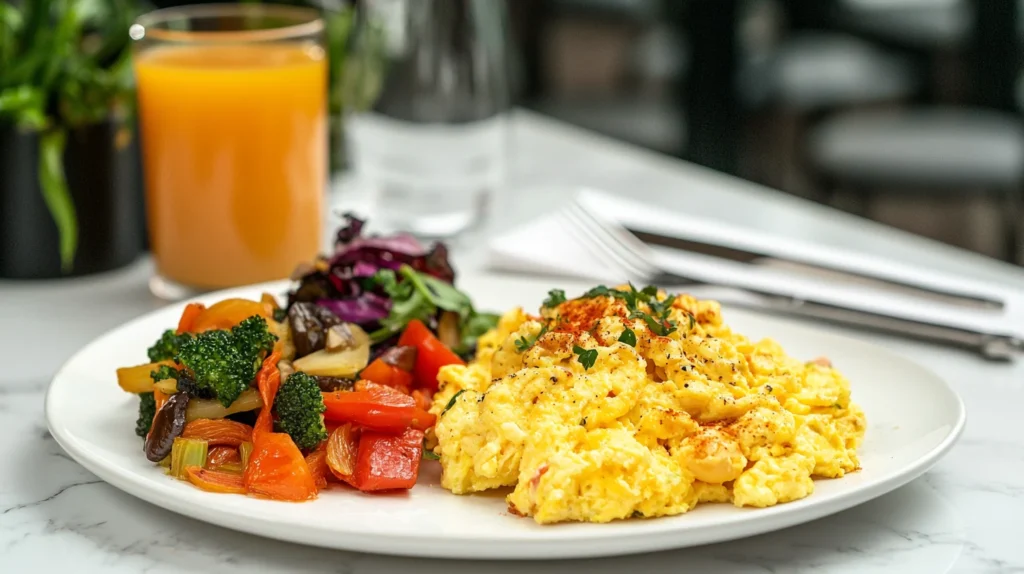Are eggs gluten-free and dairy-free? It’s a question many people ask when starting a new diet or dealing with allergies. Eggs seem simple, but confusion often arises about what they do or don’t contain. If you’re trying to stick to a gluten-free or dairy-free lifestyle, knowing the facts about eggs is a must.
First, eggs are naturally free of gluten and dairy, making them a fantastic choice for many diets. Also, they’re packed with nutrients and so versatile that you can use them in everything from breakfast to baking. For a broader understanding of gluten-free and dairy-free meal options, check out this comprehensive guide on gluten-free and dairy-free breakfasts. Whether you’re whipping up a quick omelette or crafting a fancy dessert, eggs are your go-to ingredient.
But wait—there’s more to the story. Processed egg products can sometimes sneak in unwanted ingredients. Curious to learn how to make eggs a safe and delicious part of your meals? Keep reading to find out all the details!
Table of Contents
Understanding the Basics: Are Eggs Gluten-Free and Dairy-Free?
What Makes Eggs Naturally Gluten-Free?
Eggs are naturally gluten-free, making them a fantastic option for those avoiding gluten. Gluten is a protein found in wheat, barley, and rye, but eggs come from chickens, so there’s no gluten in them. They’re also a whole food, meaning they haven’t been processed or altered in a way that could add gluten. For more inspiration, explore how different gluten-free breakfast ideas can enhance your meal planning here.

Fresh eggs in their shells are naturally safe and free from contamination. Eggs provide important nutrients like protein and vitamins while staying gluten-free. However, processed egg products may include added ingredients, so it’s crucial to read labels carefully. Eggs are incredibly versatile, perfect for all kinds of meals, from breakfast to desserts.
When choosing eggs, stick to fresh, whole eggs to keep it simple. They’re nutritious, gluten-free, and incredibly easy to use. Try them today and see the difference!
Exploring Why Eggs Are Dairy-Free
Eggs are dairy-free, even though they’re often mistaken as a dairy product. Dairy comes from mammals like cows, goats, or sheep, and includes milk, cheese, and butter. Since eggs come from chickens, they have no dairy content. This makes them safe for anyone avoiding dairy, whether for allergies or lifestyle choices.
First, eggs are packed with protein, but they don’t contain lactose, the sugar in milk that many people can’t tolerate. Also, they’re free from casein, the protein in dairy that can trigger allergies. This makes them an excellent choice for people on dairy-free diets.
Eggs are a great alternative to many dairy-rich recipes. You can scramble, bake, or fry them without worrying about dairy. Plus, they pair wonderfully with other allergy-friendly foods. Add eggs to your dairy-free menu and enjoy their versatility without compromise!
Common Misconceptions About Eggs and Allergens
Debunking Myths About Gluten in Eggs
There’s a common misconception that eggs might contain gluten, but this isn’t true. Eggs are naturally gluten-free because they don’t come from grains like wheat or barley. They come straight from chickens, and there’s no chance for gluten to sneak in. However, confusion often arises from processed egg products like pre-made omelets or egg substitutes. These sometimes contain gluten-based additives for texture or flavor.
Cross-contamination can also cause misunderstandings. For example, cooking eggs on shared surfaces with gluten-containing foods might introduce trace amounts. To avoid this, it’s important to clean utensils and cookware properly. Eggs themselves remain a naturally gluten-free option.
If you’re sticking to a gluten-free diet, fresh, whole eggs are always a safe bet. They’re easy to prepare and incredibly versatile for any meal. Enjoy eggs confidently, knowing they’re naturally gluten-free!
Why Eggs Are Safe for Dairy-Free Diets
Eggs are a fantastic option for anyone following a dairy-free diet. Despite often being grouped with dairy in grocery stores or recipes, eggs don’t contain milk or any milk-based products. Dairy refers to foods made from the milk of mammals like cows or goats, while eggs come from chickens, making them entirely dairy-free. This distinction is important, especially for those with lactose intolerance or dairy allergies.
However, some confusion arises because recipes or dishes containing eggs might also use dairy-based ingredients like butter, cream, or cheese. To keep your meals dairy-free, check recipe details carefully and opt for plant-based alternatives when cooking. Eggs themselves are safe and offer a high-protein, nutrient-rich option for your diet.
So, whether you scramble, poach, or fry them, eggs are a versatile choice. You can confidently enjoy eggs knowing they’re free of dairy and completely safe for your dietary needs!
Hidden Gluten and Dairy Risks in Packaged Egg Products
Processed Egg Products: What to Watch Out For
Processed egg products can sometimes include hidden gluten or dairy ingredients, which might not be obvious at first glance. While fresh eggs are naturally gluten-free and dairy-free, pre-packaged items like liquid egg whites or powdered egg mixes may contain added thickeners or stabilizers. These additives sometimes use gluten as a binding agent or dairy-derived ingredients to enhance texture or flavor.
Additionally, some brands may process egg products in facilities that also handle gluten or dairy items. This can lead to cross-contamination, which is a big concern for those with allergies or sensitivities. Always check ingredient labels and look for certifications like “gluten-free” or “dairy-free” to ensure the product meets your needs.
Taking extra care with these products means you can enjoy eggs safely. By staying informed and choosing wisely, you’ll avoid unexpected allergens and maintain a healthy, stress-free diet.
Reading Labels for Gluten and Dairy-Free Safety
Reading labels is one of the most important steps to avoid hidden gluten and dairy in packaged egg products. Many processed egg items, like egg substitutes or premixed omelets, can include ingredients such as milk proteins or gluten-based stabilizers. These added elements might not be obvious, so it’s crucial to review the full ingredient list carefully.
Look for labels that explicitly state “gluten-free” or “dairy-free” to confirm the product meets your dietary requirements. Certifications from trusted organizations can offer extra reassurance. Additionally, pay attention to allergy warnings or notes about shared processing facilities. Cross-contamination can occur if eggs are handled alongside gluten or dairy products.
When in doubt, reach out to the manufacturer for clarification. Taking a few minutes to double-check labels ensures your meals remain safe and enjoyable. Plus, it gives you peace of mind, making your cooking experience worry-free and fun!
Benefits of Including Eggs in Gluten-Free and Dairy-Free Diets
Nutritional Value of Eggs for Allergy-Friendly Eating
Eggs are a powerhouse of nutrition, making them an excellent choice for gluten-free and dairy-free diets. Packed with high-quality protein, they provide essential amino acids that support muscle health and repair. Eggs are also rich in vitamins like B12, which is important for energy and brain function, and vitamin D, which helps strengthen bones.
In addition to vitamins, eggs are an excellent source of minerals like selenium and zinc. These nutrients support your immune system and overall wellness. What’s more, eggs are naturally gluten-free and dairy-free, which makes them a simple and nutritious addition to your meals.
Whether scrambled for breakfast or boiled for a snack, eggs are versatile and easy to prepare. They fit seamlessly into many recipes, offering a balance of nutrition and flavor. So, start cracking! Adding eggs to your meals can help you stay healthy while enjoying delicious, safe options.
How Eggs Complement Gluten-Free and Dairy-Free Meals
Eggs are a versatile star in many gluten-free and dairy-free dishes. Their unique ability to bind, thicken, and fluff makes them an irreplaceable ingredient in both savory and sweet recipes. Whether you’re baking muffins or whipping up a creamy frittata, eggs ensure your dishes have the perfect texture and taste.

What makes eggs even better is their compatibility with other allergy-friendly ingredients. Pair them with fresh vegetables for a hearty omelet, or mix them into gluten-free flour for pancakes. They also shine as a topping for salads or grain bowls, adding a protein boost without extra prep.
Using eggs in your meals is an easy way to enhance flavor and nutrition. Plus, they’re budget-friendly and quick to cook. With eggs on hand, creating delicious and satisfying meals becomes a breeze. So, get creative and let eggs elevate your culinary adventures!
Cooking with Eggs in a Gluten-Free and Dairy-Free Kitchen
Tips for Preventing Cross-Contamination
When cooking with eggs in a gluten-free and dairy-free kitchen, preventing cross-contamination is essential. First, always use separate utensils and cutting boards for gluten-free and non-gluten-free ingredients. This small step helps avoid any accidental transfer of allergens during meal preparation.
Next, clean your workspace thoroughly before preparing meals. Even a tiny crumb of gluten-containing bread or dairy product can affect the safety of your dish. If you’re frying eggs, ensure the pan is free from residue from previous meals. Using nonstick pans dedicated to gluten-free cooking is a smart move that makes cleanup easier.
Additionally, store eggs separately from dairy-based or gluten-containing items in your fridge. Labeling containers can also reduce mistakes, especially in busy households with mixed dietary needs. These simple practices ensure your eggs stay safe and allergen-free.
For more detailed information on preventing cross-contamination in gluten-free cooking, you can refer to the FDA’s guidelines on food labeling and nutrition.
By following these steps, you can confidently prepare meals that are both gluten-free and dairy-free, ensuring a safe and delicious dining experience.
Versatile Egg Recipes for Allergy-Friendly Cooking
Eggs are a game-changer for creating allergy-friendly recipes. Their natural properties make them perfect for a variety of gluten-free and dairy-free dishes. Start your day with a fluffy vegetable-packed omelet or whip up egg muffins for an easy grab-and-go breakfast.
For lunch, eggs can transform into a hearty salad topper or star in a gluten-free quiche. If you’re in the mood for a quick snack, boiled eggs are both convenient and satisfying. For dinner, experiment with shakshuka—a flavorful dish where eggs are poached in a rich tomato sauce.
Eggs also shine in baking, acting as a binder and leavening agent in gluten-free breads and cakes. Their versatility means you can use them in sweet or savory dishes without hassle. So, grab your whisk and start exploring how eggs can elevate your cooking game. It’s time to have fun in the kitchen!
Alternatives to Eggs for Gluten-Free and Dairy-Free Diets
Plant-Based Substitutes for Eggs in Baking
Finding egg substitutes for baking is simpler than you might think! Options like flaxseeds or chia seeds are excellent. Just mix one tablespoon of ground flax or chia seeds with three tablespoons of water. Let it sit until it forms a gel-like texture, and voilà—it’s ready to use. Another great option is mashed bananas. Not only do they bind ingredients, but they also add natural sweetness to recipes.
Applesauce works wonders as a replacement in cakes and muffins. If you’re looking for a store-bought option, consider aquafaba—the liquid from canned chickpeas. It’s fantastic for recipes that require whipped egg whites, like meringues. Silken tofu is another versatile choice, perfect for denser desserts like brownies.
Each substitute offers unique benefits, so experiment to find what works best for your needs. With these swaps, you’ll bake confidently without missing a beat!
Nutritional Comparisons Between Eggs and Their Alternatives
When comparing eggs and their alternatives, each option brings different benefits. Eggs are rich in protein, healthy fats, and essential nutrients like vitamin D and B12. However, plant-based substitutes offer unique advantages for those avoiding eggs. For instance, flaxseeds and chia seeds provide fiber and omega-3 fatty acids. They’re great for boosting heart health.
Bananas and applesauce, while lower in protein, add natural sweetness and potassium. Silken tofu stands out for its protein content, making it an excellent choice for meals needing a hearty texture. Aquafaba, though not as nutrient-dense, shines in recipes needing volume, like mousses or meringues.
Each option serves different needs. While eggs are nutrient-packed, alternatives cater to dietary preferences without sacrificing flavor or texture. By understanding these differences, you can make informed choices and create dishes everyone will love!
Frequently Asked Questions (FAQs)
Can I eat eggs if I am dairy-free?
Yes, you can eat eggs if you are dairy-free! Eggs are not dairy products. Dairy comes from milk, like from cows or goats, while eggs are laid by chickens. Many people confuse them because eggs are often near dairy in stores. However, eggs do not contain milk or cream.
If you are on a dairy-free diet, eggs provide a great source of protein and nutrients. They are versatile and work in many recipes. Just check packaged foods for any combined egg-and-dairy ingredients. With care, eggs are a delicious, simple option!
Do eggs contain gluten?
No, eggs do not contain gluten. Gluten is a protein found in grains like wheat, barley, and rye. Since eggs come from chickens, they are naturally gluten-free. You can safely enjoy plain eggs if you follow a gluten-free diet.
However, it’s important to check if eggs are cooked with other ingredients. Some seasonings, sauces, or pre-packaged egg dishes might contain gluten. Always read labels or ask about added ingredients when eating out. Plain eggs, boiled, scrambled, or fried, remain a gluten-free and tasty choice. They’re perfect for simple, satisfying meals!
What are gluten-free and dairy-free foods?
Gluten-free and dairy-free foods exclude gluten, found in wheat, barley, and rye, and dairy, derived from milk. Common gluten-free foods include fruits, vegetables, rice, potatoes, and meat. Dairy-free options feature plant-based milks like almond or oat milk, and non-dairy spreads.
Eggs are naturally both gluten-free and dairy-free, making them an excellent choice for these diets. However, packaged or prepared items may contain hidden gluten or dairy, so checking labels is crucial. A gluten-free and dairy-free lifestyle opens the door to creative, healthy, and delicious meals that everyone can enjoy!
Do eggs count as dairy?
No, eggs do not count as dairy. Dairy refers to products made from milk, such as cheese, yogurt, and butter. Eggs come from chickens and are unrelated to milk or dairy products.
This distinction often confuses people, but eggs are naturally dairy-free and gluten-free. They are an excellent source of protein and nutrients, making them perfect for various diets. Just remember, while eggs are safe for dairy-free diets, always check labels on pre-packaged egg products to avoid hidden dairy ingredients. Enjoy your eggs confidently—they’re dairy-free and versatile!
Enjoying Eggs with Confidence in a Gluten-Free and Dairy-Free Lifestyle
Eggs are naturally gluten-free and dairy-free, making them a perfect choice for your diet. They are versatile, nutritious, and fit easily into most meals. Whether you’re whipping up a quick breakfast or experimenting with recipes, eggs are a great option.
First, they provide essential nutrients like protein and vitamins without the worry of gluten or dairy. Next, eggs are simple to prepare, and you can use them in endless ways. From scrambled eggs to hearty frittatas, they bring variety and flavor to your table.
Also, eggs are a budget-friendly and accessible ingredient. They work well for those following gluten-free and dairy-free lifestyles. Always check labels on processed egg products to avoid hidden risks.
Now it’s your turn to get creative! Try adding eggs to your favorite meals or testing new recipes. Share your ideas and join the conversation by leaving a comment below. For even more inspiration, follow us on Facebook and Instagram. Let eggs bring joy to your kitchen adventures!

